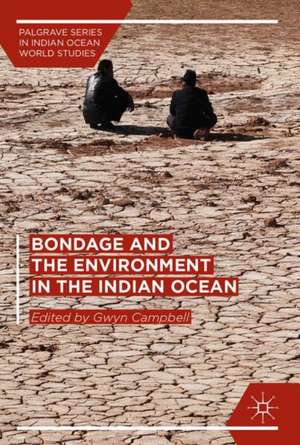Bondage and the Environment in the Indian Ocean World: Palgrave Series in Indian Ocean World Studies
Editat de Gwyn Campbellen Limba Engleză Hardback – 23 ian 2018
| Toate formatele și edițiile | Preț | Express |
|---|---|---|
| Paperback (1) | 725.43 lei 43-57 zile | |
| Springer International Publishing – 4 iun 2019 | 725.43 lei 43-57 zile | |
| Hardback (1) | 730.65 lei 43-57 zile | |
| Springer International Publishing – 23 ian 2018 | 730.65 lei 43-57 zile |
Din seria Palgrave Series in Indian Ocean World Studies
- 20%
 Preț: 629.92 lei
Preț: 629.92 lei - 18%
 Preț: 785.11 lei
Preț: 785.11 lei - 18%
 Preț: 787.91 lei
Preț: 787.91 lei - 18%
 Preț: 797.24 lei
Preț: 797.24 lei - 18%
 Preț: 1016.49 lei
Preț: 1016.49 lei - 18%
 Preț: 730.97 lei
Preț: 730.97 lei - 15%
 Preț: 643.99 lei
Preț: 643.99 lei - 18%
 Preț: 894.79 lei
Preț: 894.79 lei - 15%
 Preț: 583.93 lei
Preț: 583.93 lei - 18%
 Preț: 898.26 lei
Preț: 898.26 lei - 18%
 Preț: 795.68 lei
Preț: 795.68 lei - 9%
 Preț: 735.47 lei
Preț: 735.47 lei - 18%
 Preț: 780.19 lei
Preț: 780.19 lei - 18%
 Preț: 889.92 lei
Preț: 889.92 lei - 18%
 Preț: 786.04 lei
Preț: 786.04 lei - 9%
 Preț: 811.70 lei
Preț: 811.70 lei - 18%
 Preț: 729.06 lei
Preț: 729.06 lei -
 Preț: 423.84 lei
Preț: 423.84 lei - 15%
 Preț: 581.98 lei
Preț: 581.98 lei - 18%
 Preț: 730.16 lei
Preț: 730.16 lei -
 Preț: 384.86 lei
Preț: 384.86 lei - 15%
 Preț: 640.88 lei
Preț: 640.88 lei - 18%
 Preț: 780.06 lei
Preț: 780.06 lei - 18%
 Preț: 782.42 lei
Preț: 782.42 lei
Preț: 730.65 lei
Preț vechi: 891.04 lei
-18% Nou
Puncte Express: 1096
Preț estimativ în valută:
139.81€ • 146.36$ • 115.68£
139.81€ • 146.36$ • 115.68£
Carte tipărită la comandă
Livrare economică 07-21 aprilie
Preluare comenzi: 021 569.72.76
Specificații
ISBN-13: 9783319700274
ISBN-10: 3319700278
Pagini: 329
Ilustrații: XIII, 304 p. 5 illus.
Dimensiuni: 148 x 210 mm
Greutate: 0.53 kg
Ediția:1st ed. 2018
Editura: Springer International Publishing
Colecția Palgrave Macmillan
Seria Palgrave Series in Indian Ocean World Studies
Locul publicării:Cham, Switzerland
ISBN-10: 3319700278
Pagini: 329
Ilustrații: XIII, 304 p. 5 illus.
Dimensiuni: 148 x 210 mm
Greutate: 0.53 kg
Ediția:1st ed. 2018
Editura: Springer International Publishing
Colecția Palgrave Macmillan
Seria Palgrave Series in Indian Ocean World Studies
Locul publicării:Cham, Switzerland
Cuprins
1. Introduction: Bondage and the Environment in the Indian Ocean World.- 2. Abolition in the Midst of Turmoil: The Case of Tan Emperor Wu Zong (814-846 CE).- 3. Environment and Enslavement in Highland Madagascar, 1500-1750: The Case for the Swahili Slave Export Trade Reassessed.- 4. Volcanoes, Refugees and Raiders: The 1765 Macaturin Eruption and the Rise of the Iranun.- 5. The Environment and Slave Resistance in the Cape Colony.- 6. A Local View on Global Climate and Migration Patterns: The Impact of Cyclones and Drought on the Routier Family and their Slaves in Ile Bourbon (La Réunion), 1770-1820.- 7. The Cyclone, the Meteorologist, the Planter and the Indentured Immigrant. The Strange Story of Selective Cyclone Damage in Reunion Island, 1840s-1870s.- 8. Egypt’s Slaving Frontier: Environment, Enslavement, Social Transformations and the Local Use of Slaves in Sudan, 1780-1880.- 9. Environmental Knowledge and Resistance by Slave Transporters in the Nineteenth-Century Western Indian Ocean.- 10. Environmental Disaster in Eastern Bengal: Colonial Capitalism and Rural Labour Force Formation in the Late Nineteenth Century.- 11. Famine and Slavery in Africa’s Red Sea World, 1887-1914.
Recenzii
“The long-term climate cycles of the rather expansive “Indian Ocean World” covered here, citing an impressive array of technical climate studies, attempts to distinguish debt-bondage from slavery … . World historians of many persuasions will accordingly find useful reminders of the climate component … in which they work and of the essential historicity of slaving.” (Joseph C. Miller,Journal of World History, Vol. 29 (4), December, 2018)
Notă biografică
Gwyn Campbell is Canada Research Chair and Founding Director of the Indian Ocean World Centre at McGill University, Canada. He is also the editor of the Palgrave Series in Indian Ocean World Studies, the founder and editor-in-chief of the Journal of Indian Ocean World Studies, and a recipient of the Humboldt Research Award (2017-2019).
Textul de pe ultima copertă
Monsoon rains, winds, and currents have shaped patterns of production and exchange in the Indian Ocean world (IOW) for centuries. Consequently, as this volume demonstrates, the environment has also played a central role in determining the region’s systems of bondage and human trafficking. Contributors trace intricate links between environmental forces, human suffering, and political conditions, examining how they have driven people into servile labour and shaped the IOW economy. They illuminate the complexities of IOW bondage with case studies, drawn chiefly from the mid-eighteenth century, on Sudan, Cape Colony, Réunion, China, and beyond, where chattel slavery (as seen in the Atlantic world) represented only one extreme of a wide spectrum of systems of unfree labour. The array of factors examined here, including climate change, environmental disaster, disease, and market forces, are central to IOW history—and to modern-day forms of human bondage.
Caracteristici
Presents the first serious study of the relationship between bondage and climate Comprises essays from leading experts on the history of bondage in the Indian Ocean world Examines the complex set of environmental, economic, and political conditions which have helped to drive and shape human bondage in the Indian Ocean world
